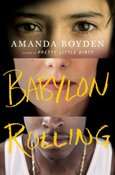Like the New Orleans parade that lends its name to the title of Amanda Boyden's novel, "Babylon Rolling" (Random House, 2008, $23.95) overflows with people. Set in an Uptown neighborhood during the year before Hurricane Katrina, the book attempts to capture the racial, sexual and class tensions that define the city.
Boyden tells the story of a block on Orchid Street through the voices of five inhabitants: Ariel May and Ed Flank, a white couple who are relatively new transplants from the Midwest; Cerise Brown, an elderly black New Orleanian who has lived in Uptown since birth; Philomenia Beauregard de Bruges, Cerise's white counterpart who is slowly losing her mind; and Daniel "Fearius" Harris, a black teenage drug dealer. Weaving in and out of each character's narrative, the diction slightly changes, but the novel's style and voice remains mostly constantwith one exception.
For Fearius Harris, Boyden adopts "black" slang to authenticate his story. The author's use of gangsta dialect, however, feels false. Lines like "But right when he went down the narrow, he could hear the whiteifieds leaving, just preppin the house for whatever the Florida peoples pay em to do" sound like notes jotted hastily from the latest Jay-Z CD rather than actual thought. More importantly, Fearius' voicetold, as are all the others, through third-personis so different from the rest of the characters that the boy's story feels disconnected from the rest of the novel's cast of characters.
Boyden does slightly better by Cerise and Philomenia, as the author gives them backstories showing how New Orleans has shaped who they are. Both women acutely observe Orchid Street, but come to different conclusions about its happenings because of their different classes and races. However, Philomenia's dementia comes across as a series of B-movie tics instead of a true illness. Although Boyden goes inside the heads of all her characters, only Philomenia's interior thoughts are italicized regularlyדTo marry an impoverished man for love is to destroy your future, Philomenia. The working world is not your placeԗas if to beat home her dementia. Furthermore, Philomenia's attempts to slowly poison the clientele of a local bar are as hackneyed as a bad "Law & Order" episode.
Cerise Brown has the opposite problem: She's preternaturally wise, kind and always knows what's best for everyone. She exists primarily to guide others through their troubles, and even offers advice to a woman she barely knows. Boyden tries to deflect this issue with ironic wit, speaking in Cerise's voiceדNow it's Cerise's time to be old and wise and import some knowledge to the naïve lady in her squash-pretty sariԗbut the effort feels forced.
Boyden is most convincing when portraying Ariel and Ed's marital turmoil, but even this is ultimately unsatisfying, because the marriage's breakdown is no more intriguing than in countless other domestic novels. There's nothing about their problems that are distinctly New Orleanian, and their drifting apart isn't connected to the community around them.
Boyden's inability to connect with characters outside of the white middle class is a major problem, given that "Babylon Rolling" is set in a city that was 60 percent non-white before Katrina. It's initially heartening to see Indira and Ganesh Gupta, two East Indian immigrants to the city, in the novel. They have the potential to offer a fresh perspectivenon-white but also non-blackon this impoverished, beleaguered southern city. But while Boyden shows flashes of Indira's wit in brief conversations with her neighbors, the author doesn't convey the Guptas' interior lives at all.
It's ambitious to try and portray the concerns and perspectives of people from different classes, races and generations, but the novel's breadth is often its biggest problem. Boyden jumps from one story to the next within chapters, going into and out of narrative arcs at odd moments. Instead of drawing the reader into the Orchid neighborhood and the lives of its residents, this channel surfing keeps the stories at arm's length.
Boyden wrote the novel's prologue and epilogue in the first-person pluralדWe choose to live uptown on Orchid Street inside the big lasso of river;" "Some of us choose to stay for Katrinaԗas if all the characters speak in one register. Indeed, they do, though that's not what Boyden intends. Boyden tries to show the variety of voices and points-of-view of those living in New Orleans, but all these voicesexcept for Fearius, who isn't believable, anywayall sound suspiciously alike, as if Boyden thought that interjecting slang occasionally would make the characters sound different.
"Babylon Rolling" is ambitious in scope but deeply flawed in character and tone. Instead of offering the voices of so many characters, Boyden would have better served her readers by concentrating on a single, well-drawn perspective.
Signed copies of "Babylon Rolling" are available at Lemuria. Call 601-366-7619 for more info.



Comments
Use the comment form below to begin a discussion about this content.